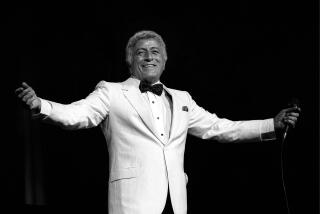The Secret Life of Benjamin Britten : * Music: The British composer’s 35-year relationship with tenor Peter Pears is intimately detailed in letters and diaries that are being gingerly published.
- Share via
LONDON — Fifteen years after his death, the intimate letters and diaries of one of Britain’s foremost composer, Benjamin Britten, have finally been published--but gingerly, behind a screen of very British circumspection. The official publication is today, but the past weeks have been tumultuous--all because Britten happened to share most of his adult life with tenor Peter Pears.
No authoritative biography has ever been written because the raw materials were posthumously suppressed by Britten’s lover and nervous trustees of the composer’s estate. But after Pears’ death in 1986, the eminent Mahler scholar Donald Mitchell was given the go-ahead to publish Britten’s correspondence. A close friend and the composer’s publisher for 13 years, Mitchell co-edited the work, titled “Letters From a Life: Selected Letters and Diaries of Benjamin Britten.”
So little was known of Britten’s inner life and so much demanded to be told that the two initial volumes, taking the composer up to the 1945 premiere of the opera “Peter Grimes,” occupy 1,400 pages. Britten’s time in America during World War II, in which he decisively influenced Aaron Copland and stumbled upon the “Grimes” poem in a Los Angeles rare-book store, account for a quarter of the text. It was during this time that his relationship with Pears deepened to become a nearly 40-year partnership.
Volume 3, not scheduled to be published for years, is expected to explore Britten’s “The Turn of the Screw,” which Music Center Opera presents for four performances beginning Saturday. Based on the Henry James novella, the work was given its premiere in 1954, with Pears creating the sinister role of Peter Quint. The opera contains implications of homosexual attraction and alienation, a theme that recurs as a subtle undertone in most of Britten’s major operas.
In recent weeks, the Britten estate, fearful of prurient exposure, imposed stringent conditions on the release of “Letters From a Life.” The trustees insisted on vetting any newspaper serialization line for line; even headlines had to be approved. The Observer, which paid a five-figure fee for the rights, was reduced to running two articles of utter blandness.
A publication party thrown by Faber & Faber Ltd. had only one copy of the book on display--and it was soon rushed away for safe-keeping. Volumes on sale in the bookstores have been shrink-wrapped in plastic inside a cased binding to prevent idle browsing. They are priced at a prohibitive 75 (about $125) to avert impulse purchases and public libraries will keep them in the not-for-loan category. Review copies have been restricted to a frugal list of leading critics.
It is as if this book is not meant to be read by the general public, but is restricted to musicologists who may examine it beneath the custodial frown of a college librarian. (The U.S. edition, at $125, will be issued in August by the University of California Press.)
The discretion contrasts strikingly with, for example, the morning-to-night media hype that Faber worked up over the mundane letters of its former editor, T.S. Eliot. Indeed, it is hard to recall any book concerning a dead artist that has been released with such caution.
The reasons are historical, and mainly obsolete. For most of Britten’s life, homosexual contact between consenting adults was an imprisonable offense. The composer and his companion were baited by homophobes such as Sir Thomas Beecham and taunted by other musicians over their pacifism and socialism.
Britten became hyper-sensitive to criticism of any kind and paranoid about his privacy. Britten, said a colleague, had one skin fewer than most mortals. His friends became doubly sensitized on his behalf.
The letters expose a timid but intensely ambitious man, fortified in his resolve by two key figures--his mother and lover. Mum believed he was the new Beethoven, the fourth B in the musical trinity. Ben could not bear to be away from her and addressed his letters to “my darling Mummy.” When she died in 1937, he lost “the grandest mother a person could have.”
Weeks later, Pears entered his life. Britten’s sister and a boyhood friend agree, in a startling revelation, that Pears’ voice was identical to his mother’s. Pears was a lyric tenor with a remarkably sweet voice, small but always artfully used. It was for this “golden” voice that Britten wrote his finest work.
Britten was born in 1913, the son of a dentist, in the seaside town of Lowestoft. Britten attended boarding school and later fell into the raffish company of W.H. Auden and Christopher Isherwood in 1930s London. According to the letters, the gay writers took him to bath houses and urged him “to decide something about my sexual life.” Neither was able to crack his physical reserve, nor was his relationship with Pears consummated until they reached a hotel in Grand Rapids, Mich., in June, 1939.
On the evidence of the letters, Pears was the active partner and retained a roving eye. Britten fretted fearfully when they were parted, worrying where his lover might stray. Pears, he confided, was “dangerous.” Auden urged him to take more risks and escape the “warm nest of love” but Britten never wavered in his devotion. He called Pears “my darling man”; the tenor replied fondly to “my boy.”
Mitchell and co-editor Philip Reed, staff musicologist at the Britten-Pears Library, resisted pressures to remove sexual passages from the letters, though such episodes are elliptical and infrequent, for the essence of the musicians’ compact was more spiritual than carnal, it appears.
Nearing his end, Britten wrote a letter to “the greatest artist that ever was.” Pears thanked him in reply for “all the heavenly joy we have had together for 35 years.” Theirs was a unique melding of talent and Britten specifically instructed Mitchell “to tell the truth about Peter and me.”
More to Read
The biggest entertainment stories
Get our big stories about Hollywood, film, television, music, arts, culture and more right in your inbox as soon as they publish.
You may occasionally receive promotional content from the Los Angeles Times.










